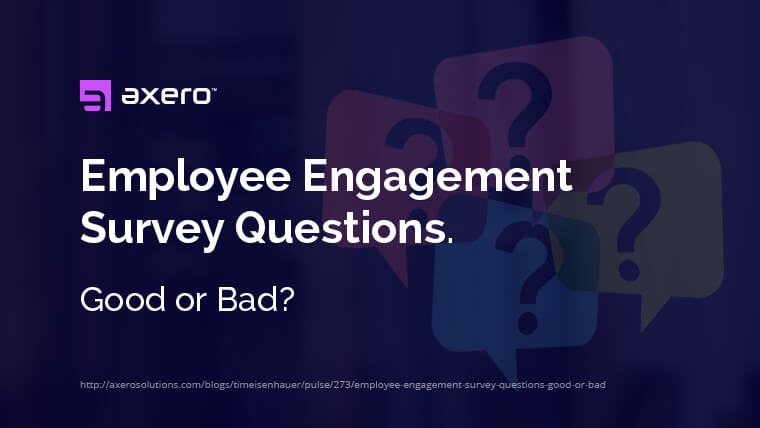
There are countless ways to get a read on employee engagement levels within your organization, and one of the most common is to come up with a list of employee engagement survey questions.
Keep in mind that this can certainly be effective in some circumstances, however, it can also be a big waste of time … so it’s important to understand which questions to ask (or not ask).
Some survey questions can provide valuable information, while others will do nothing but make employees frustrated and angry. If the survey doesn’t provide any insight or value for your employees, they won’t want to waste their time taking it … especially when they have a lot of other actual work to do.
Employee engagement survey questions – create trust first.
Choosing the right employee engagement survey questions isn’t always an easy process. There are a few things that should always be inherent in a survey question, some of which can make or break your ability to get through to your employees.
If you get one single take-away from this blog post, it is as follows:
Before You Hand Out a Survey, Try Creating Trust First
Most of the time, if you just be real with your employees and treat them with respect, they’re going to tell you what’s going on without having to take your stupid survey (yes, many of your employees will think your survey is stupid and a waste of their time).
For many companies, “walking the talk” is the hardest thing to do. In the long run, it’s the only thing that actually works with people. Trust doesn’t automatically make people want to work for you, but it makes it possible for them to focus on all the things that do matter, like goals, relationships, service, etc.
So, if you can’t figure out how to get people to trust you, and you insist that employee engagement survey questions are the answer, here’s some advice:
Don’t talk down to your employees.
No good manager would intentionally talk down to their employees in a survey question, but it could still happen unintentionally. You want your employees to know that you’re on their side and respect the work they do, not make them feel as if they’re below you. Giving a survey can sometimes raise eyebrows, so be sure that your questions aren’t condescending in any way.
Keep it short and to the point.
Long-winded employee engagement survey questions are exactly that … long-winded and borning. When an employee sees this in front of them, they typically get frustrated, and engagement levels will drop. Keeping your questions as short and to the point as possible will help ensure that this disconnect doesn’t occur, and it will generally make preparing a survey an easier process than it might be otherwise.
Create questions that elicit specific answers.
You’ll want your employee engagement survey answers to be as helpful as possible. Create questions that will elicit specific answers from your employees. This is often the most difficult aspect of coming up with great survey questions, as open-ended answers can be helpful at times, but questions that rely on specifics are far easier to analyze. Try coming up with a mix of open-ended questions and closed-ended questions. Compliment them with each other.
Don’t ask things you can already answer yourself.
Keep your surveys as brief as possible to get through to your employees, and avoid asking any questions that aren’t necessary. Some managers simply want to get written confirmation of something they already know, but this will work against what you’re trying to do. If you think you’re already solid on something in particular, skip that question altogether.
Avoid questions that are persuading.
The major reason for coming up with employee engagement survey questions is to get a true sense of how things are going with your staff. When you ask questions that might sway answers in a given direction, you’re effectively negating all the benefits you might see from giving the survey out in the first place. Keep your questions as unbiased as possible in order to avoid this common pitfall.
9 examples of employee engagement survey questions.
Now that you know what goes into creating an employee engagement survey question, let’s look at and analyze some common questions to see if they’re a good fit for your organization.
Remember … the following employee engagement survey questions are just examples, and while you can use these verbatim, you’ll do best by using them as a starting point. Tailor them to fit your company. The more you can personalize your survey questions, the more likely you’ll have positive effects.
1. How does coming to work each morning make you feel?
This is an open-ended question that can elicit very helpful answers. You’re giving your employees a chance to be honest, while keeping things neutral and not persuading them in any way. As this can be a tough question for an employee to answer, let them know that that the survey is confidential and that you’re looking for the truth; no sugar-coating … or you can simply expect to get the answer: “good”.
2. Do you understand what is expected of you at work?
An employee that doesn’t have a clear understanding of their job will obviously suffer from engagement issues. Phrasing this question in such a way can help you gauge how your managerial staff is doing. If your employees don’t know what they’re supposed to be doing at work, then you definitely have a big problem to solve.
3. Are you proud of where you work?
For employees to truly be engaged in their daily work, they need to feel as if the organization they work for is in-line with their interests. Asking employees whether or not they are proud of where they work may seem bold, but the answers you receive may end up being just as bold. Don’t lose sight of how important it is that employees feel as if they truly belong to your organization. Or you can simply expect to get the sugar-coated answer: “Yes”.
4. Do you feel close with your colleagues?
The pull towards working solo is unfortunately quite strong in the modern world, as many people believe they can handle tasks without any help from others. This can have a drastically negative impact on collaboration, and collaboration tools are the keys to success for creating great ideas and solutions. If you get the answer “NO”, then follow it up with another question, “Why not?”
5. Are you being given the right tools to get the job done?
Success only comes to those who have the right tools in their hands, and this is especially true in the world of modern business. More often than not, employees feel as if they’re lacking the necessary tools to do their job, and you need to know ASAP if this is the case. This is simply a “yes” or “no” question that will help give insight as to whether or not your staff is properly-equipped.
6. Do you feel as if your job is important?
There’s nothing worse than having a job you feel in unimportant, and almost everyone has been there at some point in their lives. Again, the “yes” or “no” quality of this question will help keep things as focused as possible, and if you end up getting a “no,” you need to jump-in and remedy the situation as soon as possible. Perhaps the individual isn’t getting the support or attention they need to truly make a difference in their role, or they may be a good candidate for a promotion to a more crucial position.
7. Do you feel comfortable contributing ideas?
For a business to move in a forward direction, everyone needs the ability to contribute their own ideas and work towards making real change. Your staff may or may not feel comfortable contributing their own ideas, which can truly get in the way of progress. Asking this question will help you gauge how comfortable your work environment is for your employees.
8. Has your supervisor helped you to succeed in your position?
Gauging the effectiveness of your managerial staff is something that should never be ignored. If you want to improve employee engagement, start at the top and make sure your higher-ups are “walking the talk.” Don’t be afraid to mix things up with this question and get even more specific.
9. Do you receive praise for your achievements at work?
This is another great question for gauging the effectiveness of managers in your organization. If your employees aren’t receiving regular praise for their achievements and are only being scolded for the things they’re doing wrong, you can expect that things are already going awry. Like many of the questions on this list, this one can seem a bit uncomfortable to ask.
In conclusion.
Analyzing the above employee engagement survey questions can be a way to ensure that you’re getting the most out of the employee experience in your organization, but it’s just the beginning. In order to truly get a sense of what’s going on, you should only use these questions as a guideline, expanding upon them in a way that is personalized to meet the needs of your staff.
Remember, creating trust is the beginning of improving employee engagement.
Surveys are just one tool of many that can be used … and it’s best to take a well-rounded approach that incorporates as many different vehicles as possible.
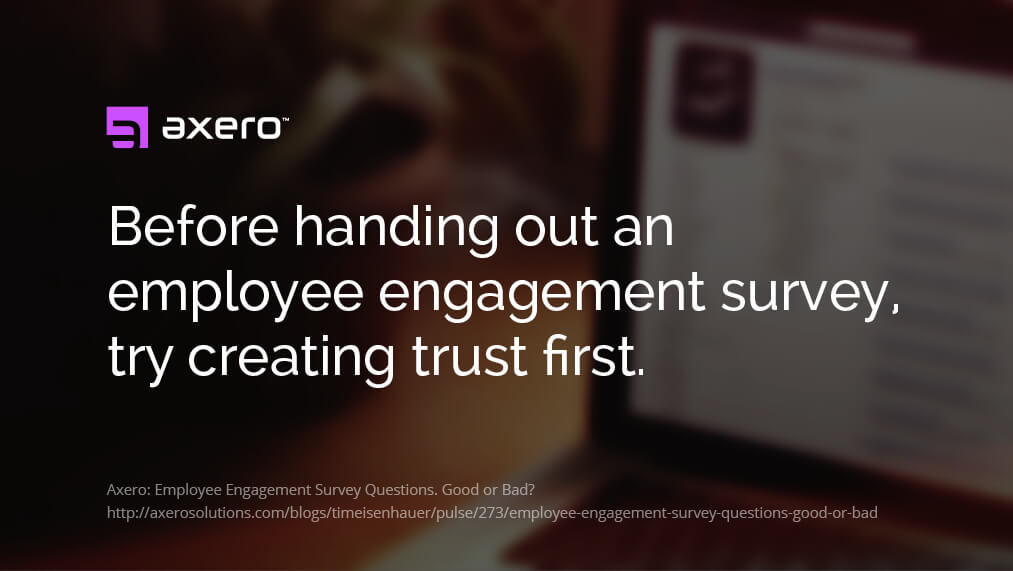
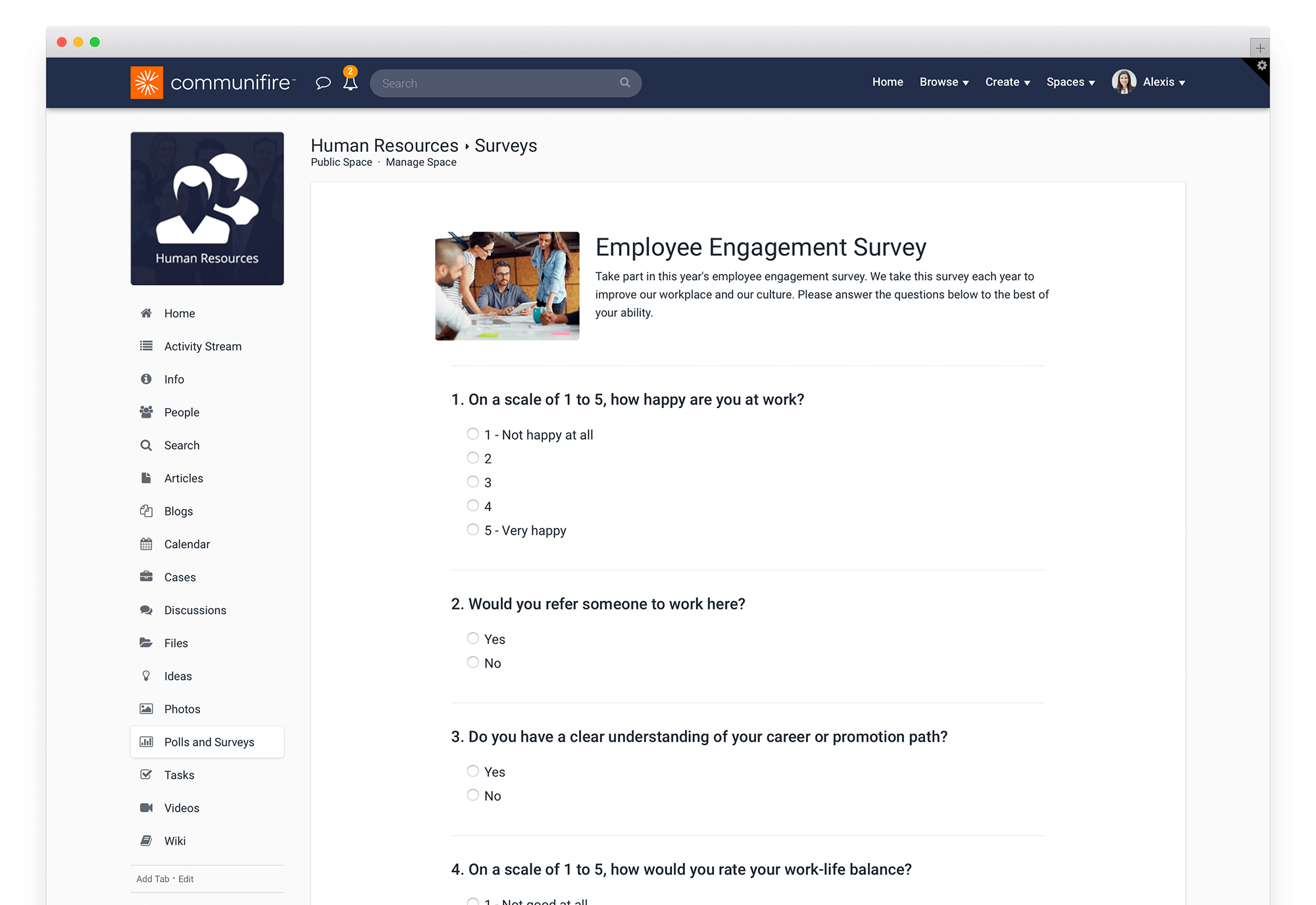

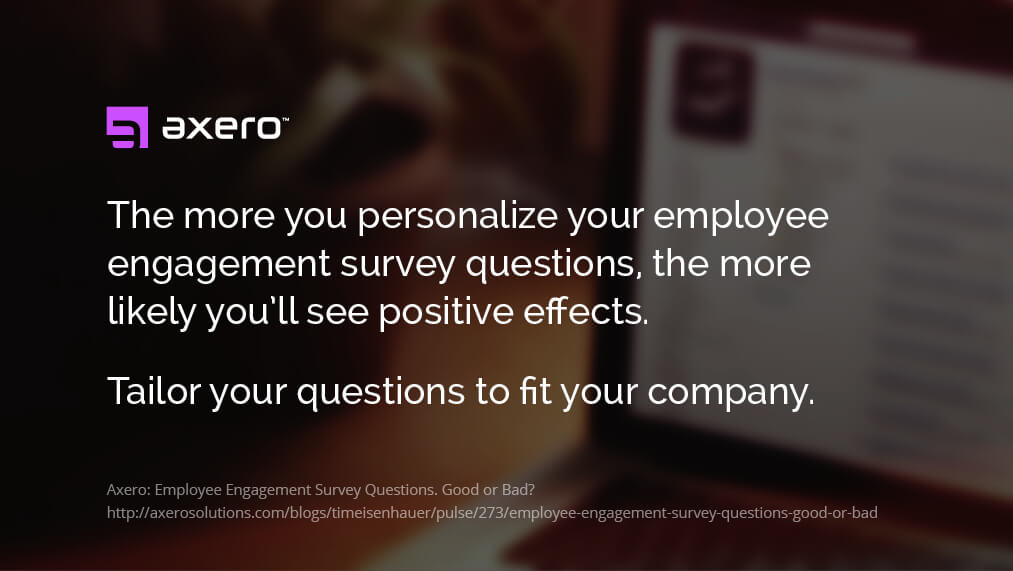
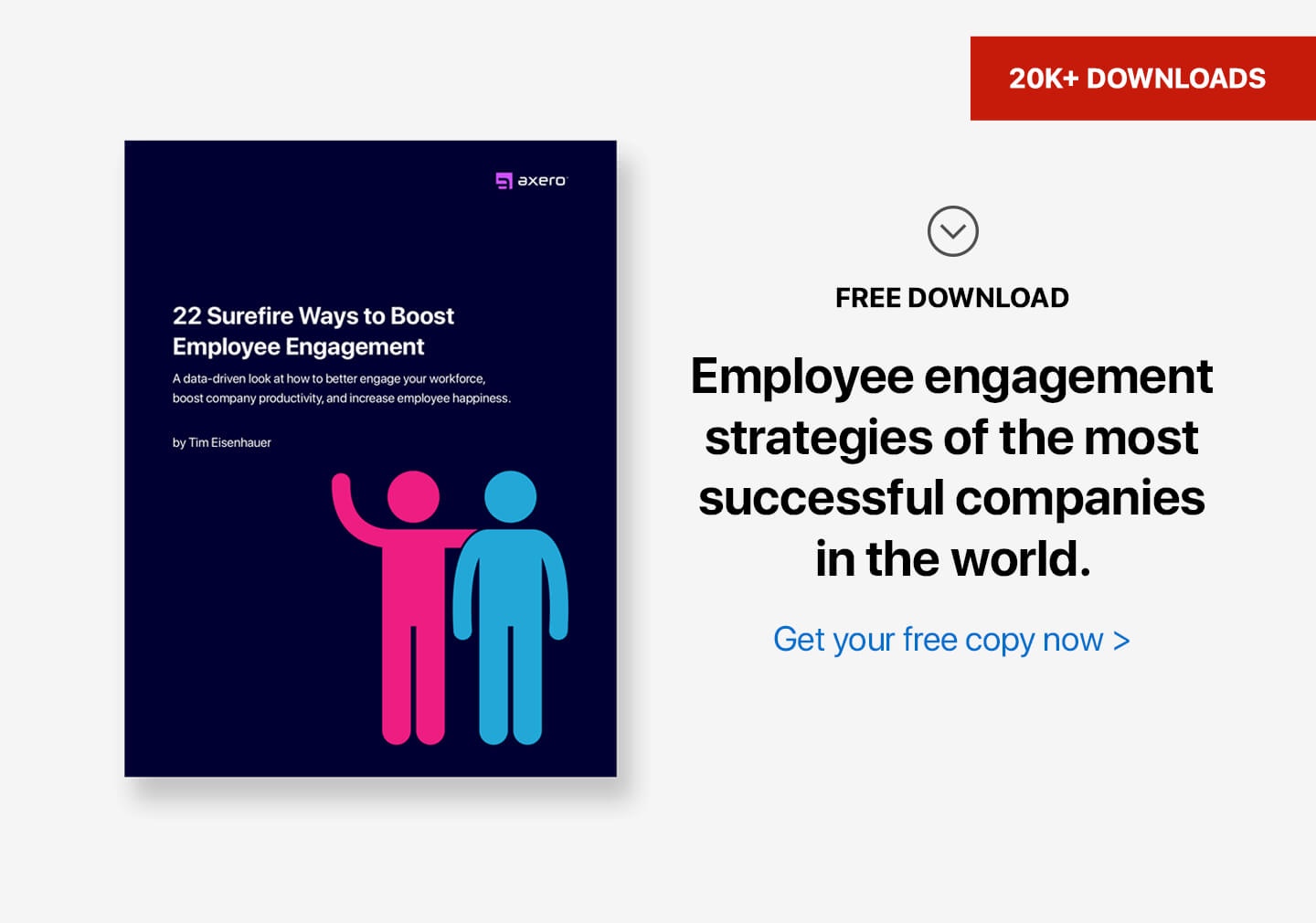










 info@axerosolutions.com
info@axerosolutions.com 1-855-AXERO-55
1-855-AXERO-55


